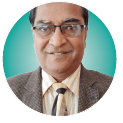‘Broadstreaming, not Mainstreaming’ – An Approach towards Solutions for Inclusive Development was delivered at XLRI, Jamshedpur as inaugural address in the conference on ‘Solutions to Inclusive Development’ on January 29, 2010. Download the presentation. Broadstreaming, Not Mainstreaming
Interact with children during bedtime
(Excerpt from the book Creative Learning by Vijoy Prakash) When young infants go to bed, they expect their parents to be with them. This is a good occasion to interact with them. It has been seen that songs and stories narrated to them at this time have great impact on the development of their brains. […]
Develop family as the first school
(Excerpt from the book Creative Learning by Vijoy Prakash) Family is said to be the first school, but we have done little to develop it as the first school. Swami Dayanand had identified father, mother and teacher to be the three pillars of education of a child. In Satpatha Brahman it was said, matriman pitrimanaachryavan […]
Right to Education for underprivileged
Project Background and Description In 2004-06, APCL had run a project with CEF on ‘Education for Democracy’. In this project, it was found that there was a need to orient learning systems to take care of the socio-cultural context of the underprivileged. For this purpose, it would be better to have laboratories in different subjects, […]
Abhivanchiton ka shikshadhikar: Educational Rights for Underprivileged
The book Abhivanchiton ka Shikshadhikar – Education for Underprivileged, authored by Vijoy Prakash and Prof Shailendra Kr Shrivastava has been published by Rajkamal Publication, New Delhi. About the book Modern education system serves the needs of upper and upper middle class only. Confined to their own world realities Lower middle and middle class […]
Address on the occasion of the Book Release Function
Address of Sri Vijoy Prakash on the occasion of the Book Release Function of the book EDUCATION FOR DEMOCRACY His Excellency the Governor of Bihar Sri Raghunadan Lal Bhatia and dear friends, I express my deep gratitude to His Excellency for having spared his valuable time to release our book Education for Democracy. This book […]
Education for Democracy
More than half a century has passed since India had adopted democracy as a way of governance. We had also visualised evolution of a democratic society through this process. How far have we moved towards realisation of this goal? How does our adolescent mind think about democracy and democratic way of living? Is our education […]
Creative Learning: A Handbook for Teachers and Trainers
We are gradually moving towards a knowledge-based society, which sustains on the strength of information to be used in all walks of life. The phenomenal rise in the use of information marks the movement of the society into a new phase of socio-economic order. In this era of information-based socio-economic order, creativity is going to […]
Right to Education for the Underprivileged
Lessons for Prevention and Management of Disability
This paper was presented in the national conference organized by Disability Commissioner, Govt. of India at Patna in April 2006. Go to the people. Live with them. Learn from them. Love them. Start with what they know. Build with what they have. But with the best leaders, When the work is done, The task accomplished, […]
Educating Underprivileged – Some critical concerns
Despite several alluring programmes and incentives in the form of cash and kinds, majority of underprivileged and poor children prefer not to go to school. Even if they do, they don’t continue there. Is it because they don’t understand the value of education or the interventions are not attractive enough to retain them in school? […]
